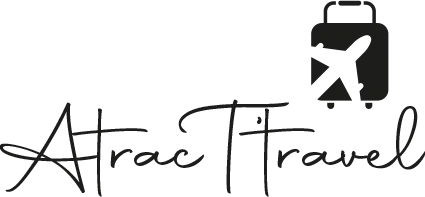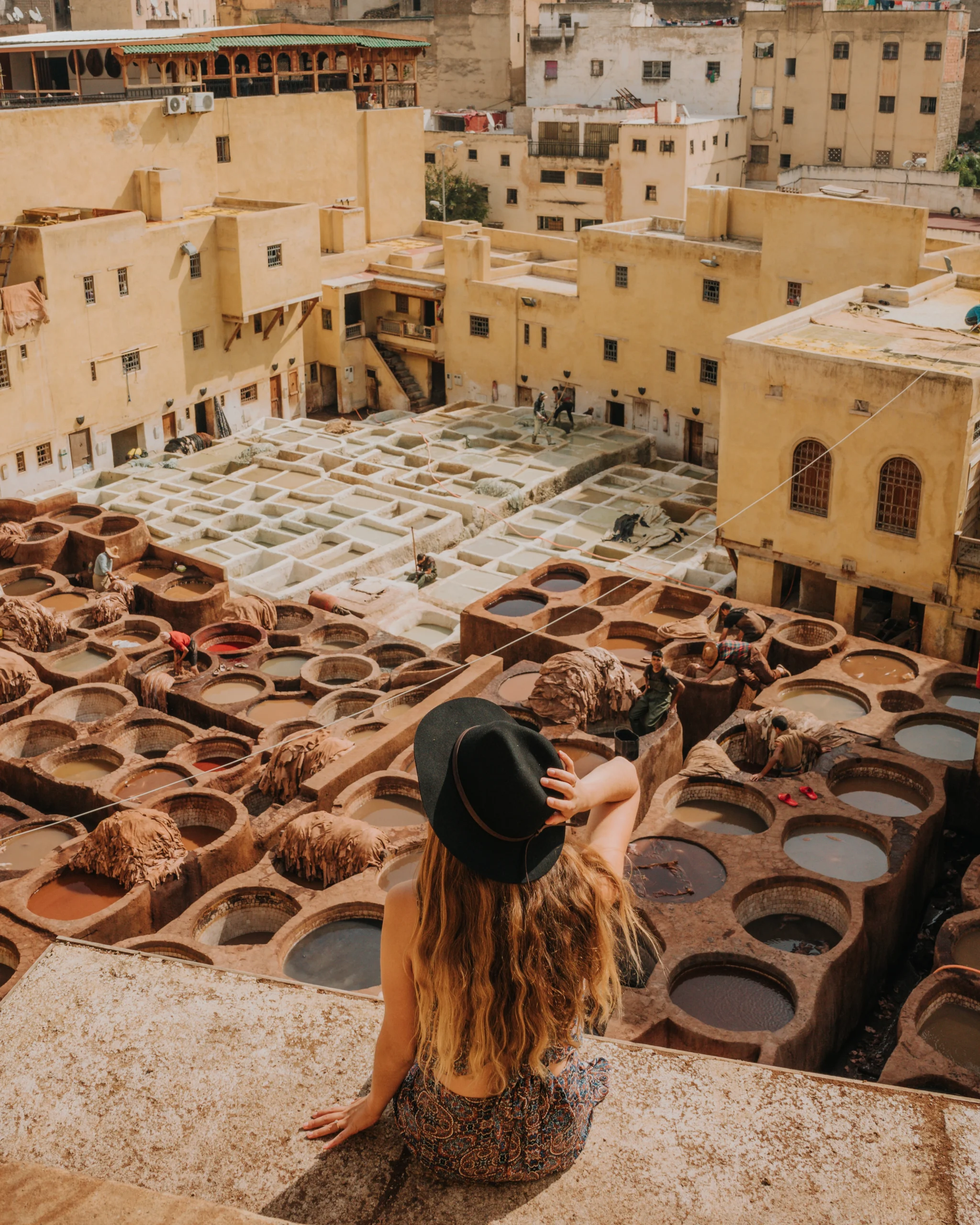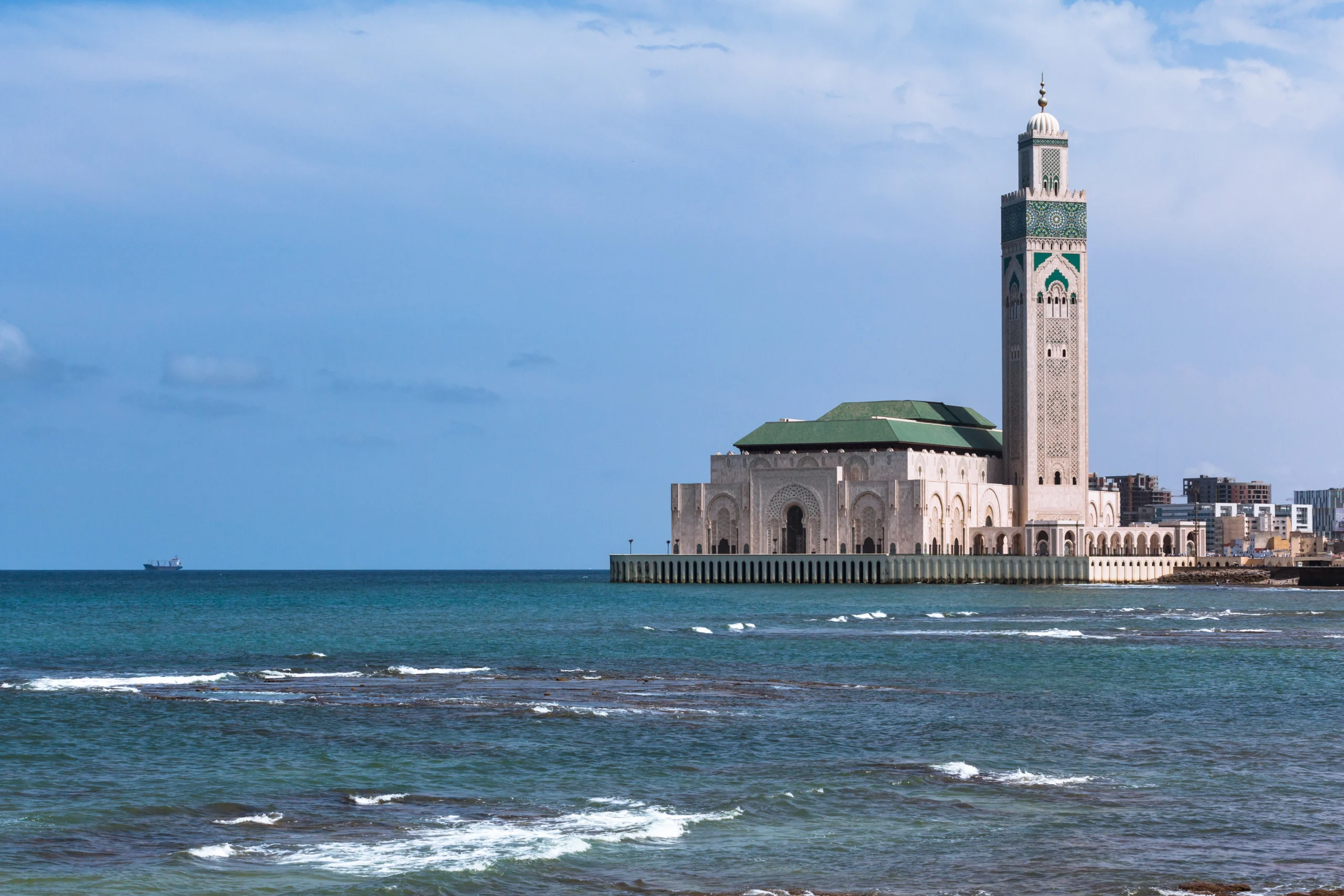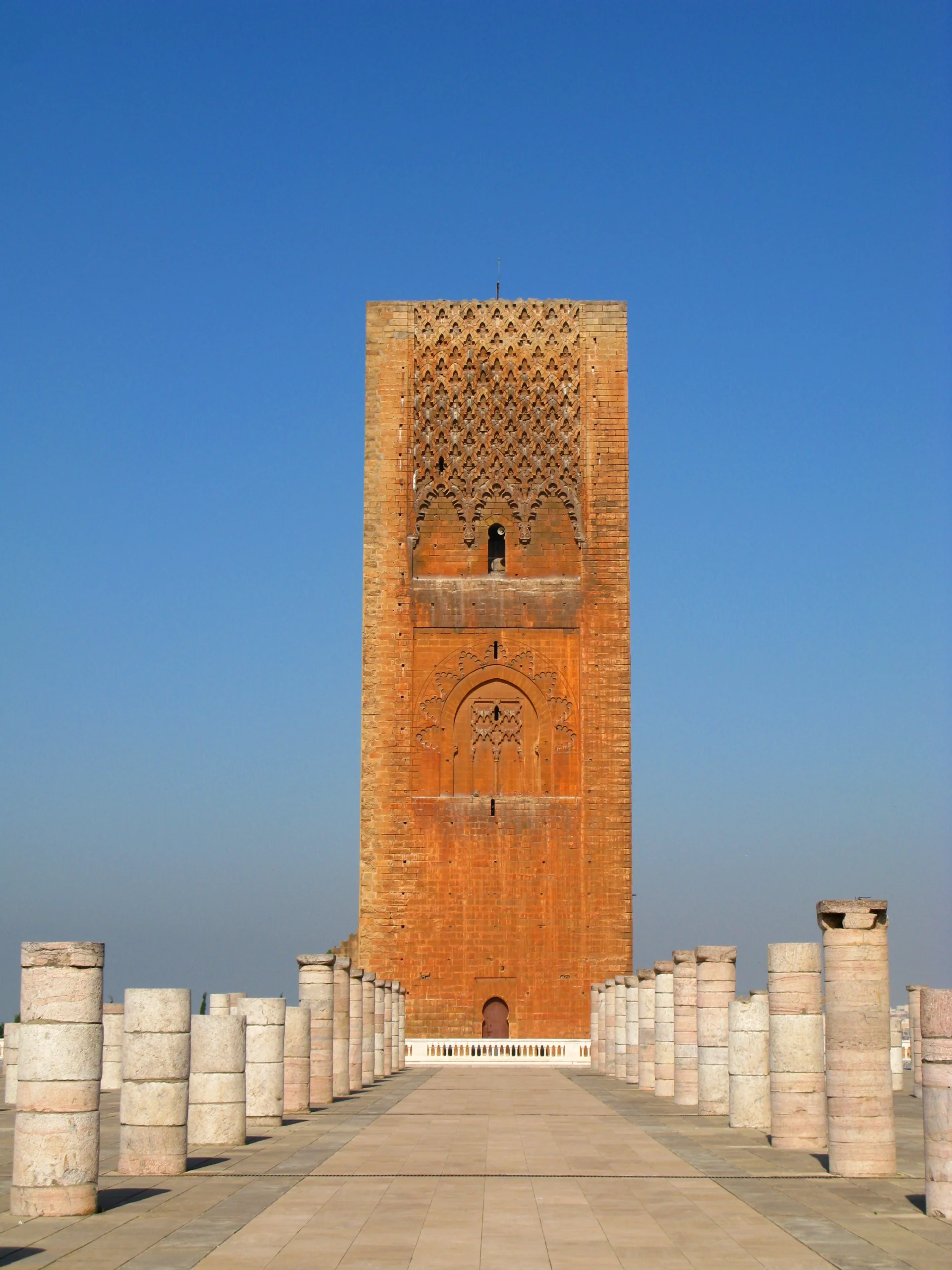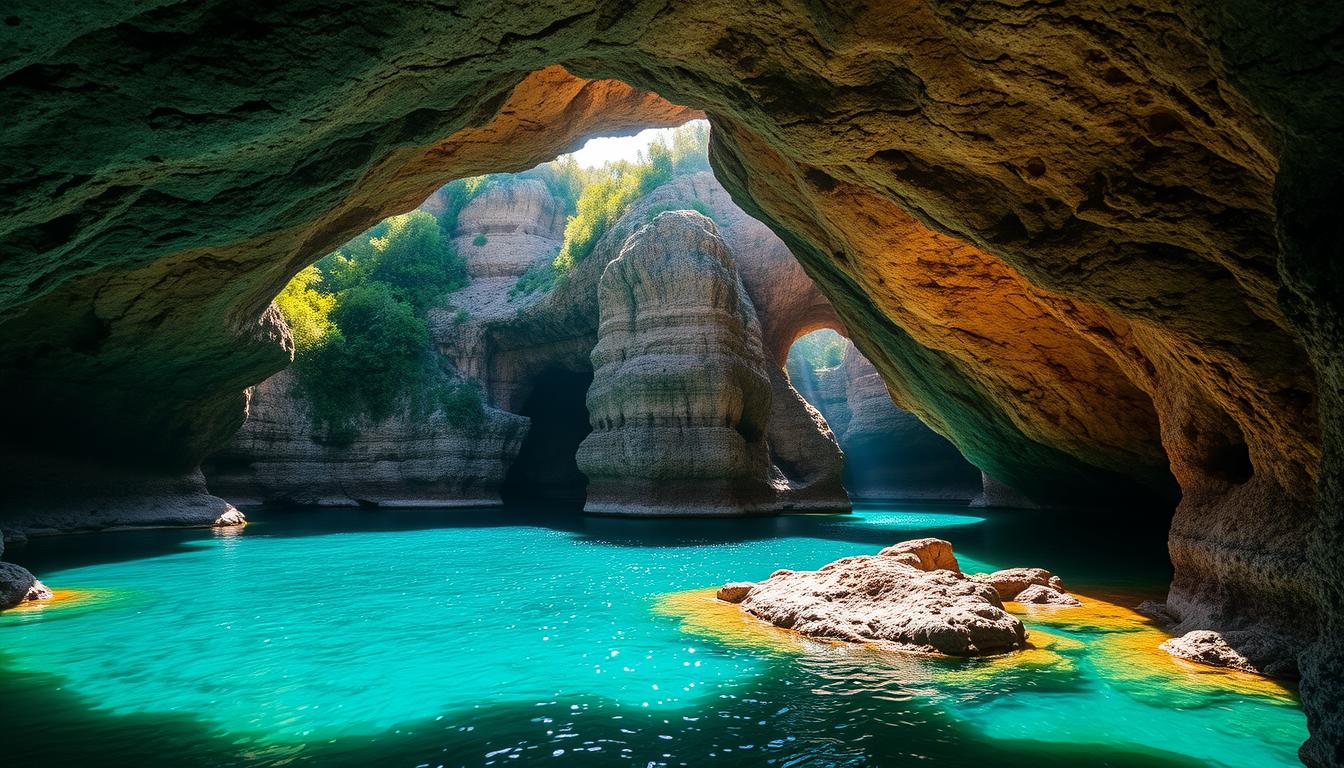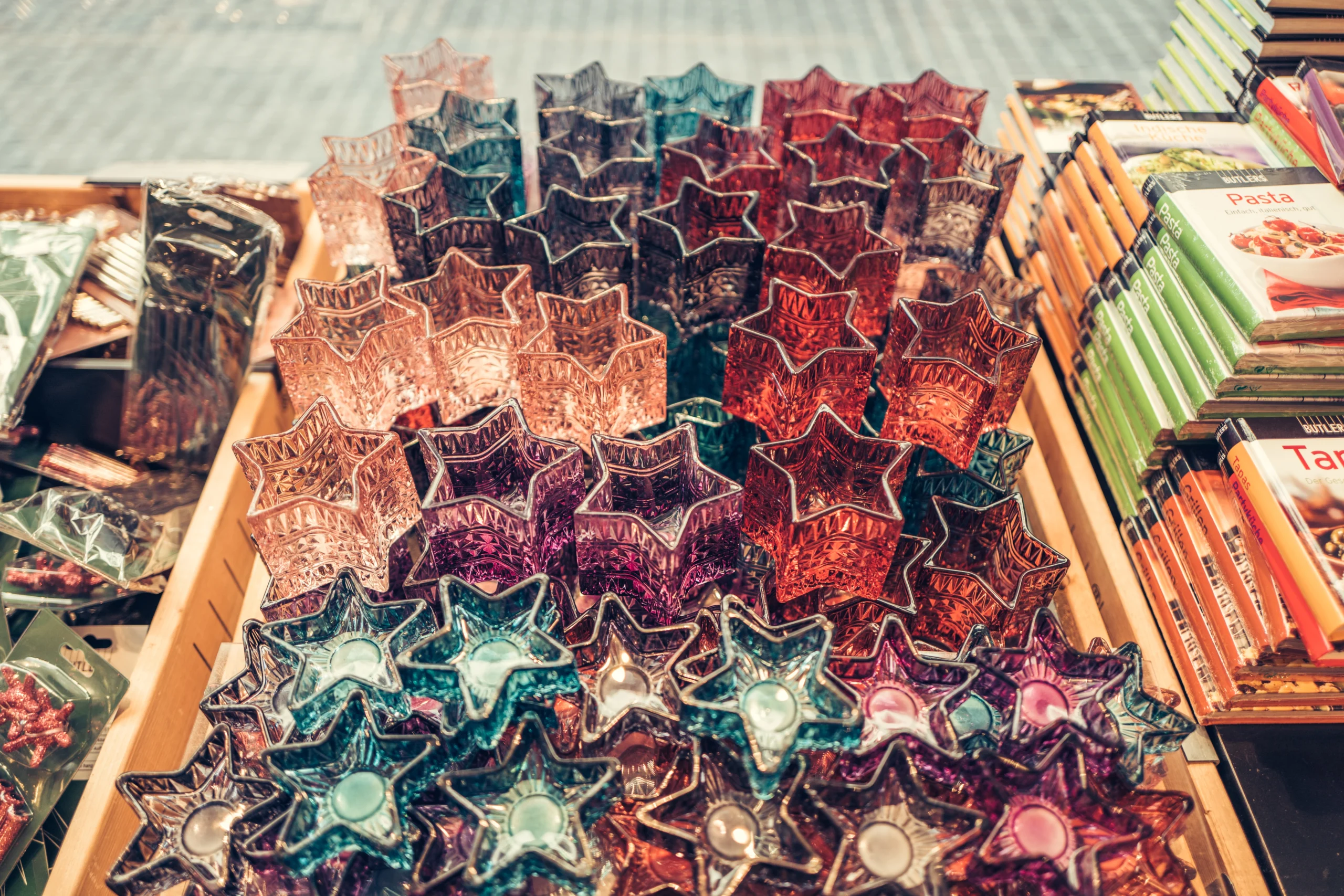When you walk through Morocco’s lively streets, you’ll see a stunning spiritual scene. Religion in Morocco, here is more than just a belief; it’s a vibrant mix of cultures and faiths. This blend has grown over centuries, thanks to migrations and cultural exchanges.
Morocco’s religious diversity is a testament to its remarkable spirit of acceptance. From ancient Berber customs to the dominant Islamic faith, and the enduring presence of Judaism and Christianity, this North African nation is a unique example of interfaith harmony. Morocco’s mix of religions has created a rich spiritual heritage, where different beliefs coexist and contribute to the country’s vibrant cultural tapestry.
Exploring Morocco’s spiritual side is like traveling through time. Here, different faiths have lived together, influencing each other and the culture. Whether you’re a curious traveler or someone who loves culture, learning about Morocco’s religious diversity offers deep insights into its society.
Key Takeaways
- Morocco represents a unique spiritual crossroads with multiple religious influences
- Islamic traditions dominate but coexist with other religious practices
- Religious tolerance is a hallmark of Moroccan social interactions
- Historical migrations have significantly shaped Morocco’s religious landscape
- Spiritual practices in Morocco blend ancient traditions with contemporary interpretations
Overview of Religion in Morocco
Morocco’s spiritual scene is rich and complex. It shows centuries of cultural and religious growth. Religion deeply influences daily life, shaping social interactions and national identity.
To understand Morocco’s spiritual heritage, we must look at its religious demographics. We also need to see how social dynamics shape religious experiences in this North African nation.
Key Religious Statistics
The majority of Moroccans are Muslims. Here’s a look at the religious makeup:
- Muslims: 99% of the population
- Jewish Community: Approximately 2,500 people
- Christian Minority: Less than 1%
Major Religious Groups
Morocco’s religious diversity is interesting. It gives us a peek into the country’s spiritual world:
| Religious Group | Percentage | Primary Characteristics |
|---|---|---|
| Sunni Muslims | 98.7% | Maliki School of Islamic Jurisprudence |
| Jewish Moroccans | 0.2% | Historic presence, mainly in cities |
| Christians | 0.1% | Mostly expatriates and foreign residents |
“Morocco’s religious landscape is a testament to centuries of cultural interaction and spiritual depth.” – Religious Historian
Islam is the main religion in Morocco. Yet, the country is known for its religious tolerance. People of different faiths live together peacefully.
Historical Background of Religion in Morocco
Morocco’s religious history is a mix of old beliefs and Islam. This North African country’s spiritual path shows how different cultures have influenced its religious practices over time.
The spiritual roots of Morocco are deep. Before Islam came, Berber tribes had their own spiritual ways. They honored nature, their ancestors, and had complex rituals.
Influence of Indigenous Beliefs
Berber spiritual traditions were unique. They focused on:
- Nature worship and animistic rituals
- Respect for tribal ancestors
- Celestial and natural symbolism
- Intricate ceremonial practices
“The spiritual landscape of Morocco is a testament to the enduring power of cultural resilience and religious transformation.” – Moroccan Cultural Historian
The Arrival of Islam
Islam’s arrival was a big change for Morocco. Arab conquests in the 7th and 8th centuries changed the spiritual scene.
| Period | Religious Transformation | Key Developments |
|---|---|---|
| 7th-8th Centuries | Initial Islamic Conquest | Arab Muslim armies enter North Africa |
| 9th-10th Centuries | Cultural Integration | Berber tribes gradually adopt Islamic practices |
| 11th-12th Centuries | Religious Consolidation | Emergence of distinct Moroccan Islamic identity |
The mix of Berber traditions and Islam created a special spiritual place. This blend kept local culture alive while welcoming Islam.
The Predominance of Islam
Islam is the heart of Moroccan society, deeply woven into the culture. Moroccan Islamic traditions show a rich mix of religious devotion. This shapes almost every part of daily life.
In Morocco, Islam is practiced in a moderate and welcoming way. It combines cultural and religious practices uniquely. Most Moroccan Muslims follow the Sunni tradition, with a focus on the Maliki school of Islamic law.
Sunni Dominance in Moroccan Islam
Islam in Morocco is mostly Sunni, with about 99% of people identifying as Sunni. The Maliki school’s flexible interpretation of Islamic law fits well with Moroccan values.
- Sunni Islam represents the primary religious tradition
- Maliki school offers moderate religious interpretation
- Religious practices emphasize community and spiritual harmony
Major Islamic Practices in Morocco
Moroccan Muslims follow key Islamic practices that shape their lives. These include daily prayers, fasting during Ramadan, and planning for the annual pilgrimage.
| Islamic Practice | Significance in Moroccan Context |
|---|---|
| Salah (Daily Prayers) | Performed five times daily, connecting community through shared spiritual rhythm |
| Ramadan Fasting | Month-long period of spiritual reflection and community bonding |
| Zakat (Charitable Giving) | Important social mechanism for supporting community welfare |
“Islam is not just a religion in Morocco, but a way of life that connects individuals through shared spiritual and cultural experiences.” – Moroccan Islamic Scholar
Exploring Islamic traditions in Morocco shows a complex mix of spiritual practices. It’s more than just religious observance; it’s a deep cultural identity.
Sufi Traditions in Morocco
Explore the mystical world of Moroccan spirituality. Sufi traditions create a deep spiritual landscape. This landscape fascinates both travelers and scholars.
The mystical side of Islam in Morocco is more than just traditional practices. Sufi spiritual exploration opens a world of contemplation, music, and divine connection.
Importance of Sufi Orders
Moroccan Sufi orders are key to the country’s spiritual life. They focus on:
- Spiritual purification
- Meditation and contemplative practices
- Preserving sacred Islamic traditions
- Building community and social harmony
“In the heart of every Sufi order lies the pursuit of divine love and inner transformation.” – Moroccan Sufi Wisdom
Famous Sufi Shrines
Morocco has many sacred sites that show the heart of Sufism. These places draw pilgrims seeking a deeper connection with Morocco’s spiritual heritage.
- Zawiya of Moulay Idriss II in Fez – A revered spiritual center
- Shrine of Sidi Abdeslem Ben Mchich in Chefchaouen
- Kasbah of the Udayas in Rabat – A historical spiritual location
Each shrine has its own story of spiritual devotion. They represent the mystical traditions that inspire many in Morocco.
The Role of Mosques in Moroccan Society
Mosques are at the heart of spiritual and community life in Morocco. They show the beauty of islamic art and architecture in morocco. These places are not just for worship. They are cultural symbols that show the depth of moroccan islamic traditions.
The beauty of Moroccan mosques tells a story of cultural mix and artistic skill. Each mosque is a mix of Islamic, Andalusian, and Berber designs. They are truly captivating.
Prominent Mosques to Explore
- Hassan II Mosque in Casablanca – A breathtaking architectural marvel
- Koutoubia Mosque in Marrakech – Historical significance and stunning design
- Al-Qarawiyyin Mosque in Fez – One of the oldest continuously operating educational institutions
Architectural Styles of Moroccan Mosques
Moroccan mosque architecture is unique. It has features that make it stand out. You’ll see detailed geometric patterns, zellige tilework, and beautiful calligraphy.
“In every stone and arch, Moroccan mosques whisper stories of faith, culture, and artistic brilliance.” – Moroccan Architectural Heritage Foundation
There are several architectural elements that make Moroccan mosques special:
- Ornamental arches with detailed geometric designs
- Elaborate zellige ceramic tile decorations
- Tall, slender minarets with detailed stonework
- Large courtyards for community gatherings
Visiting these architectural wonders helps you understand their importance. They are not just religious spaces. They are living museums of cultural heritage.
Interfaith Relations and Tolerance
Morocco is a shining example of religious diversity and respect. Its history has created a unique place where different faiths live together in peace.
The country’s religious diversity is built on understanding and respect. For centuries, different cultures have mixed, creating a society that values all religions.
Foundations of Religious Coexistence
- Constitutional protection for religious freedom
- Long-standing tradition of interfaith dialogue
- Cultural respect for different belief systems
Social Dynamics of Religious Harmony
Moroccan society is a great example of how different religions can get along. People from different faiths share spaces, celebrate together, and respect each other deeply.
“In Morocco, our strength lies in our ability to understand and appreciate our differences” – Moroccan Cultural Scholar
| Religious Group | Population Percentage | Social Integration Level |
|---|---|---|
| Muslims | 99% | Dominant |
| Christians | 1% | Well-integrated |
| Jewish Communities | 0.2% | Historically significant |
Morocco’s laws help promote religious understanding. The government supports dialogue and protects the rights of all religions, making society peaceful and welcoming.
Role of Cultural Education
Schools and community programs are key in teaching tolerance. They teach respect and understanding for all religions.
Morocco is a beacon of hope. It shows the world that different religions can live together in peace and respect.
Judaism’s Historical Presence in Morocco
Morocco’s spiritual heritage is rich with a long Jewish history. The Jewish community has greatly influenced the country’s culture. They have added to its diverse religious landscape.
The Jewish presence in Morocco goes back to ancient times. For thousands of years, Jewish communities have lived here. They have built strong roots and created lively cultural traditions.
Jewish Communities and Their Legacy
Moroccan Jews have played a big role in the nation’s growth. They have made important contributions in:
- Commerce and trade
- Artisan crafts
- Intellectual pursuits
- Cultural exchanges
“Morocco has been a unique place of tolerance and coexistence for Jewish communities throughout history.” – Cultural Historian
Key Jewish Heritage Sites to Explore
Exploring Morocco’s spiritual side means visiting these Jewish sites:
- Synagogue of Essaouira
- Jewish Quarter in Fez
- Bet El Synagogue in Casablanca
- Jewish Cemetery in Marrakech
Each place has a story of strength, cultural preservation, and the spirit of Moroccan Jewish communities.
Christianity in Morocco
In Morocco, most people follow Islam, but there’s also a small Christian community. This shows the rich spiritual mix of the country.
Demographics and Community Composition
Christians in Morocco are a minority. They include:
- Expatriate communities from European countries
- Foreign workers and diplomats
- A small number of native Moroccan converts
They make up about 0.1% of Morocco’s people. This shows the strong Islamic roots of the country.
Notable Churches and Institutions
In Morocco, there are a few but important Christian places. Key ones are:
- Casablanca’s Sacred Heart Cathedral
- Rabat’s Protestant Church
- Anglican Church in Tangier
“Religious tolerance in Morocco creates space for diverse spiritual expressions” – Moroccan Cultural Studies Report
These churches are more than places to pray. They are community hubs for both locals and expats. Even though they’re a minority, Christians in Morocco are generally respected.
Legal and Social Context
Islam is the official religion, but Morocco’s constitution protects other faiths. Christians must be mindful of cultural norms while keeping their faith.
Festivals and Religious Celebrations
Morocco’s rich religious landscape comes alive through its vibrant festivals and celebrations. These events showcase the deep-rooted moroccan religious practices. They connect communities and preserve cultural heritage. From solemn religious observances to joyous community gatherings, morocco’s religious festivals offer a fascinating glimpse into the spiritual heart of the country.
Islamic Holidays in Morocco
The Islamic calendar brings several significant celebrations that are deeply cherished in Moroccan society. Key festivals include:
- Eid al-Fitr: The festival marking the end of Ramadan
- Eid al-Adha: The Festival of Sacrifice commemorating Ibrahim’s devotion
- Mawlid an-Nabi: The Prophet Muhammad’s birthday celebration
Unique Local Traditions
Morocco’s religious celebrations extend beyond standard Islamic observances. Local traditions blend spiritual practices with cultural expressions. This creates unique experiences that reflect the country’s diverse heritage.
| Festival | Region | Significance |
|---|---|---|
| Ashura | Nationwide | Day of mourning and community gathering |
| Throne Day | Nationwide | Celebration of the King’s Accession |
| Sufi Music Festival | Essaouira | Spiritual musical celebration |
“Festivals in Morocco are not just celebrations, but a profound expression of spiritual and cultural identity.” – Moroccan Cultural Expert
These celebrations show how moroccan religious practices are deeply intertwined with community life. They create a rich tapestry of spiritual and cultural expression. This continues to thrive in modern Morocco.
Religious Education and Institutions
Religious education is key in keeping moroccan islamic traditions alive. It helps us understand the depth of religion in Morocco. The way Morocco teaches religion shows a rich history of passing down knowledge.
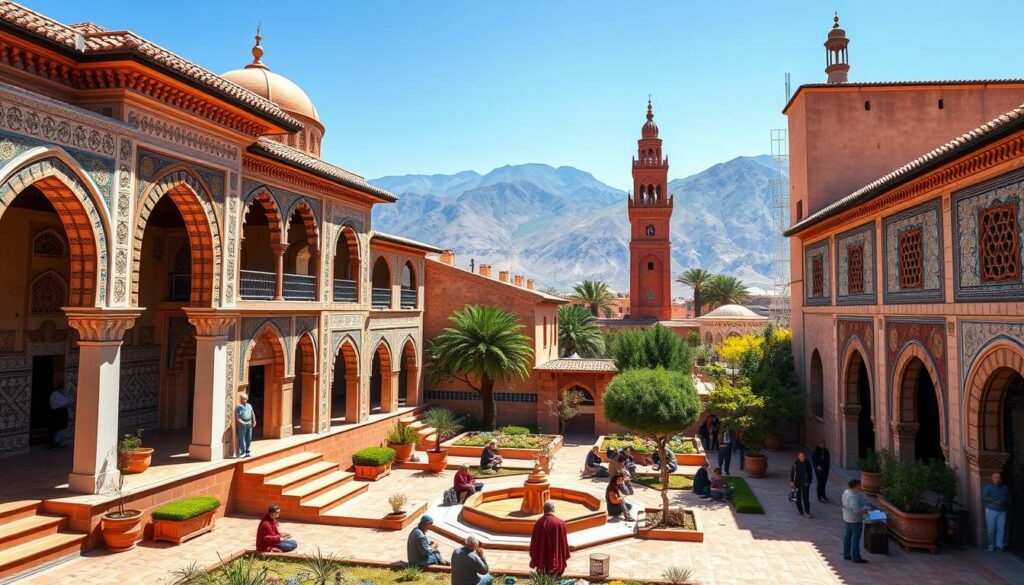
Morocco’s schools for religious learning have deep roots in Islamic tradition. These schools are important for both spiritual and intellectual growth. They shape Moroccan culture and society.
Role of Madrasas in Religious Learning
Madrasas are at the heart of religious education in Morocco. These schools focus on teaching all aspects of Islam. Students learn:
- Quranic studies
- Islamic jurisprudence
- Arabic language and literature
- Theological interpretation
Impact of Religious Schools
Religious schools in Morocco do more than teach. They are key to:
- Preserving cultural heritage
- Spreading spiritual values
- Teaching critical thinking
- Building community
“Education is the most powerful weapon which you can use to change the world.” – Adapted from a traditional Moroccan educational perspective
Students learn more than just religious texts. They also understand important social and moral values. These values guide Moroccan community life.
Influence of Religion on Moroccan Culture
Morocco’s spiritual heritage deeply influences its culture. It shapes art, literature, and even food. This connection shows in subtle yet powerful ways.
Religious themes change Moroccan art. Traditional crafts and buildings show Islamic motifs. These symbols carry deep spiritual meaning.
Religion in Arts and Literature
Moroccan literature and art blend religious inspiration beautifully. Writers and artists often use themes from Morocco’s spiritual heritage. They explore ideas like spiritual contemplation and divine connection.
- Spiritual contemplation
- Divine connection
- Mystical experiences
- Ethical and moral teachings
“In every brushstroke and written word, we find the soul of Morocco’s religious spirit” – Contemporary Moroccan Artist
Religious Influence on Moroccan Cuisine
Moroccan food reflects its religious practices. Specific laws and rituals guide how food is made and eaten.
| Religious Influence | Culinary Practice |
|---|---|
| Islamic Dietary Laws | Halal Food Preparation |
| Ramadan Traditions | Special Iftar Meals |
| Spiritual Celebrations | Festive Religious Dishes |
Religious events shape what ingredients are used and how food is cooked. Meals become a way to connect people spiritually and culturally.
Political Role of Religion in Morocco
In Morocco, religion and politics are closely tied. This mix shapes the country’s government and society. It creates a dynamic where old Islamic values meet new governance.
The monarchy is key in Morocco’s religious and political scene. The King of Morocco has a special title that shows the strong bond between leadership and faith:
The Monarch as “Commander of the Faithful”
Morocco’s monarch is more than a political leader. They are also a religious leader. This comes from moroccan islamic traditions that see the king as a spiritual guide and protector of faith.
- The king is the highest religious authority
- Religious legitimacy is key to political leadership
- Constitutional powers are tied to religious duties
Religious Leaders and Political Influence
Religious scholars and leaders in Morocco have a big say in politics. Their influence goes beyond religious places into social and government areas.
“In Morocco, faith and governance are two sides of the same coin” – Moroccan Political Analyst
- Religious leaders offer advice on policy
- Islamic institutions guide social and political actions
- Traditional religious networks shape political talks
Seeing how religion and politics work together in Morocco helps us understand its unique way of governing. Here, spiritual traditions and modern state structures live together in harmony.
The Impact of Globalization on Religion
Globalization is changing religion in Morocco a lot. It’s making old ways of practicing faith less common. Now, there are new ways to express spirituality.
The digital world has changed how Moroccans think about religion. Young people are using:
- Social media platforms
- Online religious discussions
- Global digital religious communities
- Streaming religious content
Changing Religious Practices
Old religious places are now changing to meet new needs. Religion in Morocco is mixing with global trends. This makes the spiritual scene more open and varied.
“Religion is no longer confined to physical spaces but exists in digital realms, connecting believers across geographical boundaries.” – Contemporary Religious Scholar
The Future of Religion in Morocco
Technology and globalization are making religion more personal and open. Trends show a shift towards a more individual and inclusive faith. This blends old values with new ideas.
- Increased interfaith dialogue
- More individualized spiritual experiences
- Greater theological openness
- Enhanced digital religious education
The way Moroccans practice religion is showing great strength and flexibility. This is in a world that’s more connected than ever.
Challenges Facing Religious Communities
Morocco’s religious scene is complex, with tolerance and diversity evolving. Religious groups face challenges that test freedom, expression, and unity.
- Balancing laws with real religious freedom
- Protecting rights of minority religions
- Handling social tensions between faiths
- Keeping tolerance in a fast-changing world
Religious Freedom and Rights
Morocco’s constitution says everyone has religious freedom. But, in practice, minority groups face subtle barriers. These barriers make it hard for them to fully join society.
“Religious freedom is not just about legal provisions, but about creating genuine spaces of mutual understanding and respect.” – Moroccan Religious Scholar
Contemporary Religious Challenges
Today, Morocco’s religious groups face new pressures. Globalization, tech, and changing values bring unique challenges. They need to find ways to keep their culture while moving forward.
| Religious Community | Primary Challenges | Potential Solutions |
|---|---|---|
| Muslim Majority | Balancing traditional views with modern ones | Educational reform and interfaith dialogues |
| Jewish Minority | Keeping cultural heritage alive | Community support programs |
| Christian Community | Little institutional support | Increased legal protections |
Morocco shows great strength in handling its religious diversity. It’s a model of living together, respecting tradition while being open to new ideas.
Conclusion: The Future of Religion in Morocco
Morocco’s spiritual scene is changing and growing. You’ll see how old traditions meet new ways of thinking about faith. Religion in Morocco deeply influences how people interact, their culture, and what they believe.
Morocco is at a turning point in its spiritual journey. Young people are looking at religion in a new, global way. They’re keeping traditional practices but also adding their own fresh views. This could lead to a more open and flexible understanding of religion in the future.
Prospects for Interfaith Dialogue
Interfaith talks are key in Morocco’s religious world. The country is known for its tolerance and understanding among different faiths. Programs and classes are helping to bring people together, fostering cultural exchange.
The Role of Youth in Religious Culture
Young Moroccans are changing how we see religion. They’re using tech, learning, and connections worldwide to make faith more inclusive. They’re keeping traditions alive while making them fit for today’s world.
FAQ
What is the primary religion in Morocco?
Islam is the main religion in Morocco, with about 99% of people being Muslim. Most Moroccan Muslims follow Sunni Islam, with the Maliki school being the most common.
Are other religions practiced in Morocco?
Yes, though Islam is the main religion, Morocco has a history of religious diversity. There are small groups of Christians and Jews. The country is known for its religious tolerance, thanks to its constitution.
What are Sufi traditions in Morocco?
Sufi orders are important in Morocco’s spiritual life. They focus on personal spiritual growth and have unique rituals and practices. Famous shrines and festivals are key parts of Morocco’s religious scene.
How does religion influence daily life in Morocco?
Religion deeply affects Moroccan daily life. It shapes social and cultural practices. Islamic practices like prayer times and Ramadan fasting are part of daily routines. Islamic principles also influence food, dress, and social interactions.
What religious holidays are celebrated in Morocco?
Morocco celebrates major Islamic holidays like Eid al-Fitr and Eid al-Adha. These holidays bring families together with special prayers, feasts, and charity. They are times of joy and community bonding.
Are there historical religious sites tourists can visit in Morocco?
Yes, Morocco has many historic religious sites. The Hassan II Mosque in Casablanca and the Koutoubia Mosque in Marrakech are famous. There are also Sufi shrines, Jewish, and Christian sites, showing Morocco’s rich religious history.
How does Morocco approach religious education?
Morocco offers religious education through madrasas and modern schools. The curriculum includes Quranic studies and Islamic law. It focuses on moderate and tolerant interpretations of Islam.
What role does the monarchy play in religious affairs?
The Moroccan King is seen as the “Commander of the Faithful”. He plays a unique role in protecting religious values and promoting moderate Islam. He is a spiritual leader and holds political power.
How tolerant is Morocco towards religious diversity?
Morocco is known for its religious tolerance. It has a history of coexistence among different religious groups. The country legally protects religious minorities and values mutual respect.
Are there any unique religious practices specific to Morocco?
Morocco has unique religious practices that blend Islamic traditions with local influences. These include Sufi rituals, veneration of local saints, and interpretations of Islamic practices. The country’s religious festivals also reflect its rich spiritual heritage.
